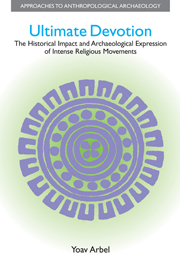 Ultimate Devotion
Ultimate Devotion from Part I
The temptations of millenarianism are matched by its risks and the hopes it inspires by the disappointments it incurs. Facing the failure of their apocalyptic promises, members of intense religious movements will see hope, joy, and pride turn into despondency and depression, as well as confusion. Having lost all confidence in traditional institutions, they invested mental, spiritual and material assets in an alternative that, incredibly, has let them down. Repercussions on both the individual and communal level are severe.
This outline can be traced in the careers of the two intense religious movements with which this chapter is concerned. Both emerged in Africa during the nineteenth century, but the people involved shared no historical, cultural, or religious background, and it is highly unlikely that many among them, if any, were even aware of the other's existence. The Cattle Killing cult of South Africa is a classic millenarian case. The Mahdi Revolt of Sudan epitomizes semi-millenarianism. These examples demonstrate clear cross-cultural patterns in the emergence, growth, action, and fall of mass intense religious movements, as well as their unmistakable historical imprint. They also indicate that while the immediate causes of religious intensification may be political and economic, those affected do not primarily seek communal freedom or material relief, nor retribution against those who deny them these essentials. More than anything they are after hope, and having faced the dehydration of other sources, they spare no means to appease the one Entity left that is able to provide it.
To save this book to your Kindle, first ensure [email protected] is added to your Approved Personal Document E-mail List under your Personal Document Settings on the Manage Your Content and Devices page of your Amazon account. Then enter the ‘name’ part of your Kindle email address below. Find out more about saving to your Kindle.
Note you can select to save to either the @free.kindle.com or @kindle.com variations. ‘@free.kindle.com’ emails are free but can only be saved to your device when it is connected to wi-fi. ‘@kindle.com’ emails can be delivered even when you are not connected to wi-fi, but note that service fees apply.
Find out more about the Kindle Personal Document Service.
To save content items to your account, please confirm that you agree to abide by our usage policies. If this is the first time you use this feature, you will be asked to authorise Cambridge Core to connect with your account. Find out more about saving content to Dropbox.
To save content items to your account, please confirm that you agree to abide by our usage policies. If this is the first time you use this feature, you will be asked to authorise Cambridge Core to connect with your account. Find out more about saving content to Google Drive.